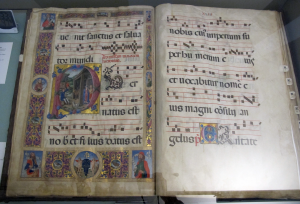
 WAS GLAD to see our new blogging colleague, Andrew Leung, post about permission in Hong Kong for replacing the propers of the Mass with other pieces of music. It gave me hope, or at least reconsideration, because from my end of things, the whole conversation we have been having about this so far is useless.
WAS GLAD to see our new blogging colleague, Andrew Leung, post about permission in Hong Kong for replacing the propers of the Mass with other pieces of music. It gave me hope, or at least reconsideration, because from my end of things, the whole conversation we have been having about this so far is useless.
Say someone in the Archdiocese of Indianapolis writes a hymn: text, music, harmonization, everything, and he wants to follow the letter of the GIRM and get it approved for use in the Archdiocese or even the United States. What is his process for obtaining such approval? There is none. So he’ll call the Office of Worship, and upon hearing the word “music,” the call will be sent to me. I will be asked about what needs to be done to obtain approval, and my answer is, “I have no idea.”
It’s not that I am ignorant of the mechanism by which approval can be obtained in the USA; it’s that there is no mechanism. There is no process. Some bishops who take GIRM 48 seriously might want to see such a piece or collection, but in the end, what bishop has time for that?
So what should happen? Should the bishop delegate the process to a commission? Probably, just as Andrew Leung points out is the norm in Hong Kong. However, I also see several problems with this solution:
1. Every diocese, and every commission, is comprised of different people, with different skillsets, ideals, and opinions. There will be a wild lack of consistency over what gets through or not.
2. If this were kicked to the national level (the USCCB), we would be adding one more layer of bureaucracy to the process. I can’t imagine the chaos that an attempt at a “national hymnal” would cause.
3. From my understanding, as things stand now, approval by one bishop counts as approval for the whole country. Therefore, something approved in Seattle is cleared in Tampa, under the current law. This means that all you need is one out of hundreds of committees to clear your work to get it by, practically invalidating the safeguard of approval altogether.
4. The need for approval will be ignored anyway. As it stands now, the GIRM is ignored, and that is binding liturgical law. It’s not a suggestion, it’s not a guideline. It’s law, and people ignore it left and right anyway in more than just this area. Further legislation or bureaucracy will just incentivize the local parishes to tune out the law even more.
So what am I saying? Should the GIRM just be ignored on this point? No, what I am saying is that the solution to this issue is—to borrow political lingo—above my paygrade. I suspect and fear that the cat is just out of the bag on this one, and no legislation from above is going to fix it. I think our efforts would be better spent winning hearts and minds to the most fitting place that Gregorian Chant and the proper texts hold in the Mass than trying to legislate it from above.

This article is part of a series:
Part 1 • Richard Clark
Part 2 • Veronica Brandt
Part 3 • Andrew Leung
Part 4 • Dr. Lucas Tappan
Part 5 • Andrew Motyka
Part 6 • Cynthia Ostrowski
Part 7 • Aurelio Porfiri
